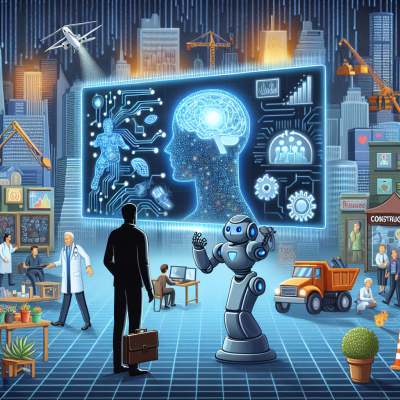
AI: A Cognitive Superpower, Not a Job Killer
Artificial Intelligence (AI) is often viewed as a threat to human jobs, sparking concerns about its impact on employment. However, LinkedIn co-founder Reid Hoffman sees AI in a different light—he considers it a “cognitive superpower” designed to enhance human capabilities rather than replace workers. In this article, we’ll explore Hoffman’s perspective on AI, its potential benefits, and how employees and businesses can adapt to this technological evolution.
Reid Hoffman’s Optimistic View of AI
Reid Hoffman, a prominent entrepreneur and venture capitalist, is a strong advocate for AI’s potential to empower individuals rather than eliminate their jobs. He emphasizes that AI can complement human skills by handling repetitive tasks, allowing people to focus on creativity, problem-solving, and decision-making.
Hoffman envisions a future where AI acts as a collaborative tool, similar to how calculators, computers, and the internet have augmented human efficiency. Instead of replacing workers, AI can serve as an assistant that enhances productivity across various fields.
How AI Enhances Human Capabilities
Rather than rendering jobs obsolete, AI has the power to elevate workplace efficiency in multiple ways:
- Automation of Repetitive Tasks: AI can handle routine and mundane activities, freeing up time for employees to engage in more strategic and creative work.
- Enhanced Decision-Making: AI-powered analytics can provide insights that help professionals make more informed decisions.
- Personalized Learning: AI-driven training platforms can help employees acquire new skills and stay adaptable in a fast-changing job landscape.
- Improved Productivity: Tools like AI-driven chatbots and virtual assistants streamline communication and workflow, allowing businesses to operate more efficiently.
Why AI Will Not Massively Disrupt Job Markets
Contrary to widespread fears, AI will not cause mass unemployment. Instead, industries will undergo transformation, resulting in job evolution rather than job extinction. Here are some reasons why AI is more of an enabler than a disruptor:
1. AI Requires Human Oversight
AI systems are not fully autonomous and still require human intervention for supervision, ethical considerations, and error correction.
2. AI Expands Business Opportunities
When businesses adopt AI, they experience increased efficiency, which can lead to expansion and the creation of more job opportunities.
3. New Job Roles Will Emerge
Just as the advent of the internet gave rise to new careers (such as digital marketers and social media managers), AI will create demand for AI specialists, data analysts, and ethical AI governance professionals.
Strategies to Stay Relevant in an AI-Driven Workplace
While AI is a tool for empowerment, professionals must adapt to its rise. Here are some essential strategies to future-proof your career in an AI-powered world:
1. Upskill and Reskill
Learning new technical skills such as data analysis, machine learning basics, or coding can increase your adaptability in an AI-driven workforce.
2. Focus on Human-Centric Skills
Critical thinking, creativity, emotional intelligence, and leadership are irreplaceable by AI. Developing these skills will make professionals more valuable.
3. Embrace AI as a Collaborative Partner
Instead of fearing AI, employees should learn how to leverage AI tools to enhance their productivity and efficiency.
The Future of AI and Employment
As AI continues to advance, industries will undergo adjustments, but these changes will lead to an evolution of roles rather than widespread job loss. Organizations and individuals embracing AI as a complementary tool will benefit the most from this technological revolution.
Reid Hoffman’s perspective serves as a reminder that AI is not a threat but an enabler. By fostering collaboration between humans and AI, the workforce can achieve unprecedented levels of productivity, efficiency, and innovation.
Are you ready to leverage AI as a cognitive superpower? The future doesn’t belong to machines—it belongs to those who learn to work alongside them.


Leave a Reply